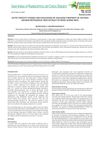 February 1999 in “Drugs in R & D”
February 1999 in “Drugs in R & D” The document concludes that various drugs for men's health issues are in development, with treatments for sexual dysfunction and prostate conditions being the most advanced.
9 citations,
November 2016 in “Archives of Plastic Surgery” The L-U mixture promotes hair growth as effectively as minoxidil.
 88 citations,
February 2011 in “Journal of Dermatological Science”
88 citations,
February 2011 in “Journal of Dermatological Science” Minoxidil helps hair growth by activating the β-catenin pathway.
 42 citations,
February 2018 in “International Journal of Molecular Sciences”
42 citations,
February 2018 in “International Journal of Molecular Sciences” Minoxidil boosts hair growth by triggering growth factor release from specific stem cells.
 16 citations,
November 2016 in “Journal of Cosmetic and Laser Therapy”
16 citations,
November 2016 in “Journal of Cosmetic and Laser Therapy” Laser and light therapies, especially the 308 nm excimer laser, are effective and safe for treating alopecia areata, but more research is needed.
7 citations,
December 2021 in “Pharmaceutics” The nanoemulsion with garlic oil, apple cider vinegar, and minoxidil could effectively treat alopecia areata.
 1160 citations,
November 2018 in “Physiological Reviews”
1160 citations,
November 2018 in “Physiological Reviews” The document concludes that better targeted treatments are needed for wound healing, and single-cell technologies may improve cell-based therapies.
 February 2016 in “Online journal of biological sciences”
February 2016 in “Online journal of biological sciences” Henna and honey improved burn healing and hair growth in rabbits.
 September 2019 in “Asian Journal of Pharmaceutical and Clinical Research”
September 2019 in “Asian Journal of Pharmaceutical and Clinical Research” Teak seed extract is safe and reduces pain in mice.
 January 2025 in “Journal of Cutaneous and Aesthetic Surgery”
January 2025 in “Journal of Cutaneous and Aesthetic Surgery” Low-level laser therapy effectively improves hair growth in androgenetic alopecia with minimal side effects.
 October 2023 in “Current Issues in Molecular Biology”
October 2023 in “Current Issues in Molecular Biology” The YH complex, made from Astragalus membranaceus and Cinnamomum cassia, may help treat hair loss by promoting hair growth and follicle development.
 8 citations,
July 2012 in “Cambridge University Press eBooks”
8 citations,
July 2012 in “Cambridge University Press eBooks” Androgens can both increase body hair and cause scalp hair loss.
 106 citations,
July 2013 in “Advances in wound care”
106 citations,
July 2013 in “Advances in wound care” UV radiation can help sterilize wounds and promote healing but requires careful use to avoid damaging cells.
 88 citations,
June 2016 in “Human Reproduction Update”
88 citations,
June 2016 in “Human Reproduction Update” New hormonal contraceptives are safer, have fewer side effects, and offer health benefits for women.
 30 citations,
September 2004 in “Experimental Dermatology”
30 citations,
September 2004 in “Experimental Dermatology” Scalp hair follicle culture has limits for testing minoxidil's hair growth effects.
3 citations,
January 2023 in “Agronomy” KDML105 bran extract may help with hair growth and prevent hair loss.
 46 citations,
September 2010 in “Southern Medical Journal”
46 citations,
September 2010 in “Southern Medical Journal” Hair loss treatments include medications and new methods like low-level light therapy, which may work by boosting cell activity and blood flow.
 108 citations,
October 2004 in “Anesthesiology”
108 citations,
October 2004 in “Anesthesiology” Preoperative pain assessment, regional anesthesia, and vitamin C can help prevent CRPS after surgery.
 November 2020 in “Bali Medical Journal”
November 2020 in “Bali Medical Journal” PRP may help hair growth in alopecia areata without major side effects, but more research is needed.
 42 citations,
January 2006 in “Obstetrical & Gynecological Survey”
42 citations,
January 2006 in “Obstetrical & Gynecological Survey” The document concludes that correct diagnosis and management of PCOS are important, and more research is needed on its risks and treatments.
 August 2023 in “Stem Cell Research & Therapy”
August 2023 in “Stem Cell Research & Therapy” A substance called Cell-free fat extract can effectively treat common hair loss by increasing hair growth and density.
 July 2023 in “Stem Cells Translational Medicine”
July 2023 in “Stem Cells Translational Medicine” Mesenchymal Stem/Stromal Cells (MSCs) help in wound healing and tissue regeneration, but can also contribute to tumor growth. They show promise in treating chronic wounds and certain burns, but their full healing mechanisms and potential challenges need further exploration.
 23 citations,
December 2013 in “Regenerative Medicine”
23 citations,
December 2013 in “Regenerative Medicine” Hair follicle culture helps develop new treatments for hair loss.
 61 citations,
May 2010 in “Integrative Cancer Therapies”
61 citations,
May 2010 in “Integrative Cancer Therapies” There is no clear recommendation for using selenium in cancer patients; it may be beneficial to correct low selenium levels before treatment.
 March 2024 in “Journal of functional foods”
March 2024 in “Journal of functional foods” Collagen peptides from marine and bovine sources may help prevent hair loss by affecting hair follicle stem cells differently.
1 citations,
May 2017 in “InTech eBooks” New treatments focusing on immune pathways show promise for stubborn hair loss.
 20 citations,
July 2008 in “Dermatologic Therapy”
20 citations,
July 2008 in “Dermatologic Therapy” The document says that treating the root cause of hair follicle damage is crucial to prevent permanent hair loss, and treatment options vary.
 January 2024 in “International Journal of Dermatology Venereology and Leprosy Sciences”
January 2024 in “International Journal of Dermatology Venereology and Leprosy Sciences” Patients with acne vulgaris have lower serum irisin levels.
 June 2023 in “Antioxidants”
June 2023 in “Antioxidants” Lipids from Schizochytrium sp. help prevent hair loss by protecting hair cells from damage and promoting hair growth.
14 citations,
January 2016 in “International Journal of Trichology” Many women with hair loss also have thyroid issues, high blood pressure, and low Vitamin D.

























